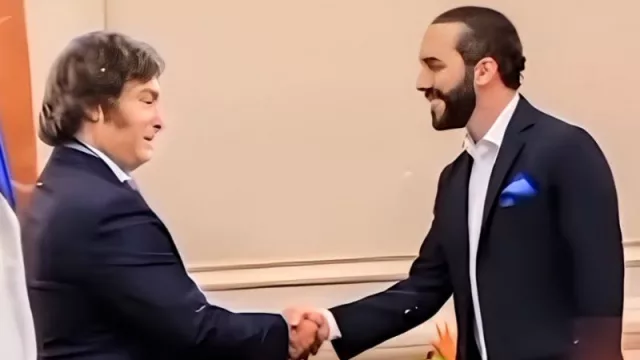The art of war. The art of peace. The art of relationships:
In today's world, public relations is not about staying on the sidelines or pleasing everyone; it requires making firm decisions at both national and international levels. In this regard, Milei is demonstrating coherence in his policies.
Milei's approach encompasses two consistent policies: one focused on diplomacy led by Mondino and the productive agenda, and another oriented towards financial-geopolitical strategic impact. This signifies a significant shift in international policy, not only concerning Argentina's history but also within the current global context.
Although it may not be everyone's cup of tea, Argentine politicians between 1870 and 1915 were known for their excellence in international relations and their influence both domestically and internationally. However, Argentina later turned inward, embracing a false notion of nationalism that hindered its progress. Argentine politicians closed off Argentina and propagated false truths, dogmas, and even deceived with economic indicators, social indices, agreements, and debt amounts.
Milei's openness across all areas of Argentina, trapped in its self-deception, represents a significant change in the country's politics. His steadfast stance opposes terrorism, organized crime, excessive state bureaucracy, corruption, uncontrolled monetary issuance, among other societal ills.
-
To achieve real change in Argentina, it is essential to break free from the backwardness, fanaticism, and self-deception that have plagued the country for decades. Milei's strategy, akin to San Martín's in his time, aims to transform the macroeconomic and political environment to free Argentina from the chains that bind it.
-
In reality, San Martín was heavily criticized for squandering resources and time outside the borders, instead of defending them. Milei employs a similar strategy but has assembled a great team to defend it internally.
-
More than two centuries later, power strategies remain relevant, now in a context of cultural battle and ideological manipulation. Milei's leadership in international relations agenda and accelerating political and economic changes challenges the current global division and aims to reposition Argentina on the world stage.
Despite the criticisms and conflicting opinions, Milei's determination to drive a counter-current agenda is a praiseworthy act both from a human and political perspective, amidst an increasingly polarized and challenging world.
Bukele, Milei, Italy... and many others have shared vital priorities:
-
Milei is clear, no to terrorism in any of its forms.
-
No to organized crime in any sphere, whether private or state.
-
No to the immense overdimension of the State and to the bureaucratic political structure and lineage (Caste).
-
No to corruption in the state apparatus and to populism.
-
No to uncontrolled monetary issuance, no to fiscal imbalance, no to the politicking that defends and distorts inflation, the excess of non-productive positions, the overdimension of plans, inefficiency, and lack of control in all sectors of the State.
-
No to the collusion between private companies, international organizations, and militant media that are complicit in a system that impoverishes cultures and economies of peoples.
To prevent this from continuing to happen in Argentina, a profound change is needed. Remaining solely in Argentina will not be sufficient in the short term, as the country is considerably lagging behind, more than is recognized and much more than the statist politics wish to admit.
Argentina suffers from delay, bias, fanaticism, isolation, and, worse, long-standing self-deception. What Milei is carrying out is nothing less than the global and generous strategy of San Martín. To liberate Argentina, it is crucial to transform the macro environment. This strategy is extremely intelligent, clear, and coherent.
More than two centuries later, with the explosion of media and culture, and the current ongoing cultural battle, power strategies remain the same. However, now, through ideological manipulation, those considered "severe, upright, orderly" are labeled as crazy.
-
From a journalistic, market analysis, or geopolitical perspective, it is evident that the current government of Spain, Venezuela, Cuba, Iran, the Ks, the Latin American left, the current governments of Colombia and Brazil, and radical Islamism share common interests. If we broaden the view, we will see that Russia, China, and North Korea are also part of the same interests of this group.
-
On the other hand, we find the United States (including the Democrats), republicanism, Donald Trump prominently, a large part of NATO, the new Spanish right, the Spanish center-right, the Italian government, the British, Israel, some Arab countries (although they disguise it), and in Latin America, Bukele, countries like Paraguay, and Milei.
-
Milei is leading a vast agenda of relationships and accelerating political and economic events at a macro level, while his chancellor and team receive constant calls and requests for meetings and agreements.
-
Milei is catching up on a century of delay in a matter of months, working in a deeply divided world, like it or not.
-
It is evident that many advocate for avoiding conflicts and staying on the sidelines. However, this stance has allowed tyrannical regimes like Venezuela to continue subjugating their peoples, as is the case with Cuba.
-
As time progresses and the obvious is discussed, the power networks that confuse democracy with demagoguery, that distort fascism as rectitude, that mix populism with the struggle for equal rights, and that distort the fundamental principles of the State, continue to take advantage in all political spheres.
This is detrimental to the prosperity of nations, beyond personal preferences and opinions. This sort of perversion of politics, political parties, and state institutions requires a Luther-like reform in a way.
The lack of self-criticism and militant bias, ideological fallacy, political distortion is too evident in the world today, and requires a philosophical review of ideologies, and specifically, an imperative shift towards the impeccability of state administration, and this is a global cause.
This situation goes beyond personal or ideological preferences. It is a resounding fact.
Milei has made the decision, like few others, to promote a common "contrary" agenda, which is a commendable action, given the very poor results obtained in recent decades from the advance of statist and leftist ideologies, both from a human, political, and economic perspective.












Tu opinión enriquece este artículo: